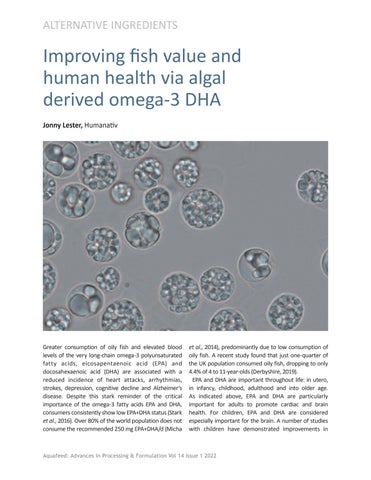ALTERNATIVE INGREDIENTS
Improving fish value and human health via algal derived omega-3 DHA Jonny Lester, Humanativ
Greater consumption of oily fish and elevated blood levels of the very long-chain omega-3 polyunsaturated fatty acids, eicosapentaenoic acid (EPA) and docosahexaenoic acid (DHA) are associated with a reduced incidence of heart attacks, arrhythmias, strokes, depression, cognitive decline and Alzheimer’s disease. Despite this stark reminder of the critical importance of the omega-3 fatty acids EPA and DHA, consumers consistently show low EPA+DHA status (Stark et al., 2016). Over 80% of the world population does not consume the recommended 250 mg EPA+DHA/d (Micha
et al., 2014), predominantly due to low consumption of oily fish. A recent study found that just one-quarter of the UK population consumed oily fish, dropping to only 4.4% of 4 to 11-year-olds (Derbyshire, 2019). EPA and DHA are important throughout life: in utero, in infancy, childhood, adulthood and into older age. As indicated above, EPA and DHA are particularly important for adults to promote cardiac and brain health. For children, EPA and DHA are considered especially important for the brain. A number of studies with children have demonstrated improvements in
Aquafeed: Advances in Processing & Formulation Vol 14 Issue 1 2022










